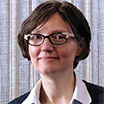
My SLP Toolkit
Jennifer Buck, SPHR, Director of Human Resources, UW Educational Outreach
I took SLP in 2010, when I was new to the UW and had only a few years of supervisory experience, and the workshop material continues to be a tremendous support to me today. In fact, some models and tools resonated so strongly with me and have such practical application, my colleagues have become quite used to my literally pulling out a page from my SLP playbook—or, in this case, a worksheet or diagram from my SLP binder—to aid in problem-solving, coaching, and other areas.
Although our internal HR team in UWEO is small, we support more than 200 Professional Staff and SEIU contract-classified employees; in addition, I have some management responsibilities associated with our 50 union-represented extension lecturers and occasionally provide support to our hourly lecturers, of whom we have about 600. Given the size and complexity of our organization, it's been incredibly valuable to have a UW-specific leadership toolkit at my fingertips.
Gaining Fundamental Tools
I regularly use the two-minute coaching challenge as well as the feedback guidelines from SLP, both when giving feedback myself and when guiding others on how to give feedback. I feel that, at the supervisory level in UWEO, SLP has assisted us with taking tone and assumptions out of feedback and with giving feedback more effectively. In the past, I think there was a tendency to either assume negative intent or, at the other end of the spectrum, give feedback that was so nice that the person receiving it didn't even realize they were receiving constructive feedback.
I've also found the waterline model highly useful; it's a great reference when we're trying to figure out what stage of a problem to address. Sometimes, for instance, we may be focusing on employee relations, like an interpersonal issue, and then realize the problem is actually much deeper, say at the systemic level. Discovering that relatively early in the process allows us to get to the root of problems much more quickly.
About once a month, after a meeting or discussion, a colleague will say "you might find this helpful" and then share a page or two from their SLP materials with me. I like knowing I'm not the only one who actively references my binder materials, and it's also made it clear that other grads realize long-term benefits from SLP. In fact, I've noticed a difference between our supervisors who have attended SLP and those who haven't. The ones who haven't more often struggle with supervisory basics and may spend a lot more time worrying about how to address issues. Fortunately, I'm in a role where I can ask someone if they've taken SLP and hopefully nudge them along in prioritizing that. When I encourage someone to take SLP, I tell them it's going to train them how to be a supervisor the UW way but, perhaps even more important, it's also going to offer them an opportunity to go through a series of exercises that will help them self-reflect on how they come across as a supervisor.
Reflecting and Connecting
On a personal note, a valuable tool that I learned about in SLP is the ladder of inference. I use this whenever I hear about something someone did or is in the process of doing and I start to have an emotional response. Instead of jumping to conclusions or making assumptions, I've learned to sit down with the person and start asking questions for clarity. What I love about that is I've never been disappointed by our team at UWEO. By taking the time to investigate the situation in an unbiased manner, time and time again I've found that people have the right motivations but were either misunderstood or needed a bit of redirection.
SLP is also a good example of how you learn just as much from the people in the room as from the workshop materials. Not only were there good discussions in class that gave me ideas about the right and wrong way to approach problems, a number of us followed up with each other after SLP to exchange information. The truth is, for some things at the UW there's not a policy or official guideline posted, or things are not quite as clear or as definitive as we'd like them to be, so being able to learn how others addressed certain concerns or situations made a big difference for me.
Prior to SLP I'd received a limited amount of leadership training and mostly had relied on mentors. At my last company, which was a start-up, I had a fantastic mentor with decades of experience who regularly gave me sage advice about my approach and messaging. Of course, we can't all expect to find a key mentor at every stage in our leadership development, but in many ways SLP has helped fill that gap for me. It gave me a solid foundation for supervising at the UW, peers to exchange ideas with, and a reliable and robust set of tools that are still an asset to me five years later.


